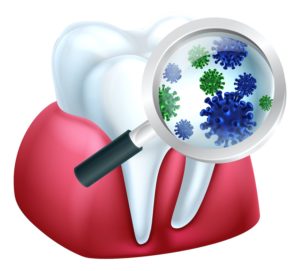Gum disease, also known as periodontal disease, refers to an infection of the gum tissue and underlying bone. It affects more than half of adults in the United States. Though common, many people do not know that this infection can lead to severe, lasting damage to your smile.
To prevent oral infections like gum disease, dentists ask patients to practice thorough oral hygiene to clean plaque and excess bacteria from their teeth and gums. But certain factors will put some dental patients in more danger of gum problems than others. Read on to learn about issues that could put your smile at a greater risk of contracting gum disease.

What Heightens the Risk of Gum Disease?
Aggressive Oral Bacteria
Good oral hygiene practices (ie. home care such as brushing, flossing, mouthrinses) can keep excess oral bacteria at bay. The mouth naturally contains bacteria, but some people may develop particularly aggressive oral bacteria. The cause of this is unclear. But it may lead to the destruction of bone and tissue along with other unpleasant symptoms associated with gum disease.
In this case, good home care alone might not be enough to protect your gums from infection. Your dentist and dental hygienist can evaluate your teeth and gums during your regular check-ups to determine the preventative care that your smile will need.
They may recommend special toothpastes or toothbrushes and will train you in effective oral hygiene techniques, including proper technique for daily flossing, for you to implement at home. They may also suggest an antibacterial mouthwash that can help to balance your oral bacteria. These rinses can decrease the chances of contracting infections like gum disease when used as part of a daily oral hygiene regimen.
Underlying Health Conditions
Factors like age, genetics, and certain medications can impact your gum health. Adults over the age of 65 might see a 70% increase in their risk of gum disease according to the American Academy of Periodontology.
If you have an underlying medical condition, you might see an effect on your gum health too. For instance, heart disease, arthritis, and diabetes can create inflammation throughout the body, which raises your risk for gum disease and bone loss. The reverse is also true in that gum disease is a source of inflammation in your body that can compromise your overall systemic health, including your cardiac health.
Changes within your body, like pregnancy or fluctuating hormones, could also make your gums more prone to infection. Talk to your dentist about your medical history, as this could play a role in your overall dental care.
Poor Oral Habits
Your habits and lifestyle can affect your oral health, especially your gums. Smoking, for example, can introduce many health concerns to the body. One of these is the fact that tobacco usage can contribute to gum inflammation and can slow tissue healing in the mouth, which will then put your gums in danger of infection.
Your diet will also influence the health of your gums. Make sure you eat nutritious foods with plenty of vitamin C that will improve your immune system along with your body’s ability to fight infections like gum disease.
Even if you practice oral hygiene as often as you should, your gums could still be at risk of disease if you do not use proper brushing and flossing techniques. Do not rush your oral hygiene routine. Clean your smile purposefully and thoroughly at home, and seek routine teeth cleanings and oral exams from your dentist.
